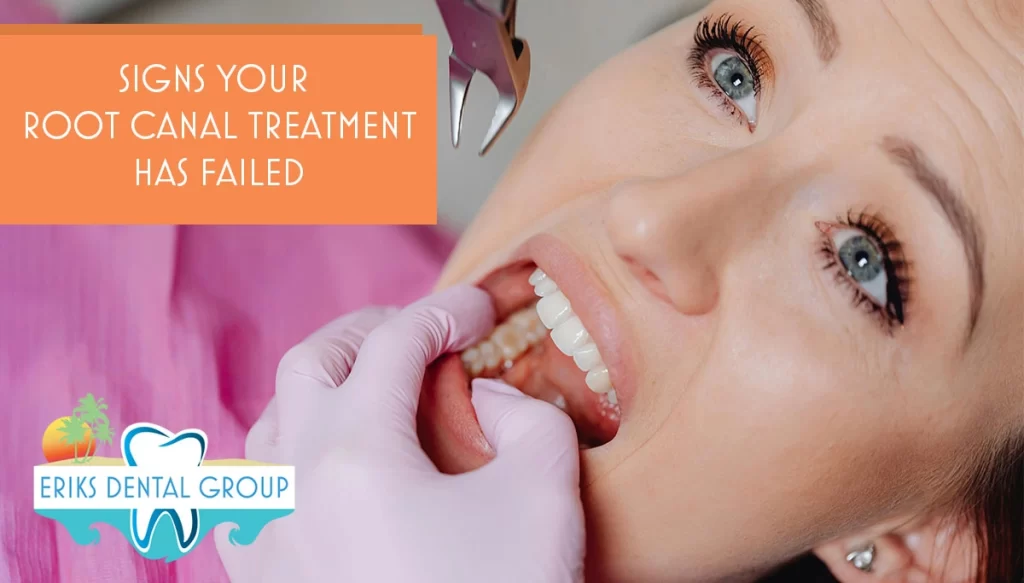A root canal treatment is a common procedure usually due to an infection, decay, injury, or trauma to a tooth. A root canal procedure is performed by an endodontist, who will clean, disinfect, fill, and seal the tooth’s interior.
While 86% – 98% of root canal treatments are successful, complications can happen. If you’ve recently undergone a root canal treatment and start to experience pain at the treated tooth site, it may indicate a complication or failure of a root canal. If this happens, you should contact your endodontist immediately for evaluation.
Recognizing The Signs Of Root Canal Failure

Some individuals may not exhibit noticeable symptoms despite underlying issues, making follow-up check-ups essential. However, common indicators of a failed root canal often mirror the original symptoms that necessitated treatment, including:
- Persistent Pain: Mild to severe discomfort around the treated tooth. Often felt as you bite down.
- Swelling and Tenderness: Inflammation and sensitivity in the gums near the treated area, potentially accompanied by facial or neck swelling.
- Tooth Discoloration: A tooth that darkens or develops a grayish tint post root canal could indicate internal damage.
- Recurring Abscesses: Small pus-filled bumps or sores may develop on the gums, indicating a persistent infection.
- Prolonged Sensitivity: Lasting discomfort when consuming hot or cold foods or pain while chewing beyond the normal healing period.
- Sinus Problems: A runny nose, jaw discomfort, or congestion, especially with an upper tooth, may suggest an infection has spread to the sinuses.
Why Do Root Canals Fail?
Here are some of the reasons why a root canal treatment may fail:
- Incomplete removal of bacteria
- Hidden or missed canals
- Poor sealing leading to reinfection
- Delayed or faulty crown placement
- Cracked or fractured tooth
Higher Risk of Failure in Molars
- Molars have a higher failure rate for root canals because they have multiple canals. Unlike front teeth, which usually have one root canal, molars often have three to four canals. Some of these canals can be small, curved, or hidden, making it difficult for the dentist to thoroughly clean and fill them. Incomplete cleaning increases the risk of bacterial survival.
- The higher chewing pressure of molars can lead to cracks or fractures after a root canal. The cracks can allow bacteria to re-enter, causing infection.
- Molars are located at the back of the mouth, making them harder to reach and treat properly, especially in patients with limited mouth opening.
Potential Complications Of An Untreated Failed Root Canal
If left untreated, a failed root canal can lead to serious complications, including:
Spread of Infection
An untreated failed root canal can allow bacteria to proliferate, potentially leading to a dental abscess (a painful collection of pus). If the infection spreads beyond the tooth, it can affect surrounding tissues and, in severe cases, enter the bloodstream, leading to systemic issues.
Bone Loss
Chronic infection from a failed root canal can cause the deterioration of the surrounding jawbone, compromising the structural integrity of adjacent teeth and potentially leading to tooth loss.
Sinus Complications
When upper teeth are affected, an untreated infection can spread to the maxillary sinuses, leading to sinusitis. This can cause symptoms like nasal congestion, pressure, and pain.
Systemic Health Risks
In rare cases, the bacteria from a dental infection can spread to other parts of the body, potentially leading to serious conditions such as endocarditis (infection of the heart’s inner lining) or other systemic infections.
What To Do If You Suspect A Failed Root Canal
If you suspect a failed root canal and cannot immediately access dental care, temporary measures that can help manage symptoms until you see your dentist.
These measures are temporary and not a substitute for professional dental care. Seek dental attention as soon as possible.
- Maintain Oral Hygiene: Gently brush and floss to keep the area clean, reducing bacterial growth.
- Rinse with Warm Salt Water: This can help alleviate discomfort and reduce inflammation.
- Over-the-Counter Pain Relievers: Use medications like ibuprofen or acetaminophen to manage pain, following the recommended dosages.
- Cold Compress: Apply to the outside of your cheek near the affected area to reduce swelling and numb pain.
- Avoid Aggravating Foods: Steer clear of very hot, cold, or hard foods that might exacerbate pain or cause damage.
- Stay Hydrated: Drinking water can help flush out bacteria and keep you hydrated, supporting overall health.
Seek Immediate Dental Care

While these measures can provide temporary relief, they are not substitutes for professional treatment. If you experience pain or other signs of root canal failure, contact Eriks Dental Group at 561-733-4004 for prompt evaluation and care.

